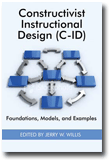
Constructivist Instructional Design (C-ID)
Foundations, Models, and Examples
Edited by:
Jerry W. Willis, Manhattanville College
A volume in the series: Research, Innovation & Methods in Educational Technology. Editor(s): Chrystalla Mouza, University of Delaware. Nancy C. Lavigne, University of Delaware.
Published 2009
This book is about emerging models of design that are just beginning to be used by ID types. They are based on constructivist and chaos (non-linear systems or "soft systems") theory.
This book provides constructivist instructional design (C-ID) theorists with an opportunity to present an extended version of their design model. After an introductory chapter on the history of instructional design models, and a chapter on the guiding principles of C-ID, the creators of six different C-ID models introduce and explain their models. A final chapter compares the models, discusses the future of C-ID models, and discusses the ways constructivist designers and scholars can interact with, and work with, instructional technologists who use different paradigms.
CONTENTS
Preface. SECTION I: THE MANY FOUNDATIONS AND FACES OF INSTRUCTIONAL DESIGN. Three Trends in Instructional Design, Jerry Willis. Instructional Design: Is it Time to Exchange Skinner's Teaching Machine For Dewey's Toolbox? Karin Wiburg. Constructivism, Instructional Design, and Technology: Implications for Transforming Distance Learning, Maureen Tam. Foundations of Instructional Design: What's Worth Talking About and What is Not, Jerry Willis. Constructivism In Instructional Design Theory, Frank Dinter. Considering the Philosophies of Wittgenstein, Dewey, and Rorty as Potential Foundations for C-ID, Jerry Willis. SECTION II: THE FAMILY RESEMBLANCES OF C-ID. Emergent Design and Learning Environments: Building on Indigenous Knowledge, D. Cavallo. Fast Prototyping as a Communication Catalyst for E-Learning Design, Luca Botturi, Benedetto Lepori, and Stefano Tardini. Conducting Research on Practice, Virginia Richardson. The Use of Participatory Design in the Implementation of Internet-Based Collaborative Learning Activities in K-12 Classrooms, Marcos Silva and Alain Breuleux. Agency of the instructional Designer: Moral Coherence and Transformative Social Practice, Katy Campbell, Richard Schwier, and Richard Kenny. Constructivist Underpinnings in Donald Schön's Theory of Reflective Practice: Echoes of Nelson Goodman, Elizabeth Anne Kinsella. SECTION III: R2D2 AND OTHER C-ID MODELS. Basic Principles of a Recursive, Reflective Instructional Design Model: R2D2, Jerry Willis. A General Set of Procedures for C-ID: R2D2, Jerry Willis. Design as Knowledge Construction: Constructing Knowledge of Design, Katherine Cennamo. From Three-Phase to Proactive Learning Design: Creating Effective Online Teaching and Learning Environments, Rod Sims. Design-Based Research and Technology-Enhanced Learning Environments, Feng Wang and Michael Hannafin. Appreciative Instructional Design (AID): A New Model, Karen E. Norum. SECTION IV: C-ID IN PRACTICE: EXAMPLES FROM THE FIELD. Constructivist Instructional Design: Creating a Multimedia Package for Teaching Critical Qualitative Research, Brandie Cólon, Kay Ann Taylor, and Jerry Willis. A Cervical Cancer CD-ROM Intervention for College-Age Women: Lessons Learned From Development and Formative Evaluation, Alexandra Evans, Elizabeth Drane, Karl Harris, and Tara Campbell-Ray. From Pedagogy to Technagogy in Social Work Education: A Constructivist Approach to Instructional Design in an Online, Competency-Based Child Welfare Practice Course, Gerard Bellefeuille, Robert R. Martin and Martin Paul Buck. About the Authors.
-
Paperback978-1-930608-60-3
Web price: $62.04 (Reg. 72.99)
-
Hardcover978-1-930608-61-0
Web price: $89.24 (Reg. 104.99)
- eBook9781607522577

- EDU001000 - EDUCATION: ADMINISTRATION: General
- EDU037000 - EDUCATION: Research
- EDU015000 - EDUCATION: Higher
-
 Evaluating Electronic Portfolios in Teacher Education
Evaluating Electronic Portfolios in Teacher Education
-
 Evaluating Technology in Teacher Education
Lessons From the Preparing Tomorrow’s Teachers for Technology (PT3) Program
Evaluating Technology in Teacher Education
Lessons From the Preparing Tomorrow’s Teachers for Technology (PT3) Program
-
 Frameworks for Integrated Project-Based Instruction in STEM Disciplines
Frameworks for Integrated Project-Based Instruction in STEM Disciplines
-
 Preparing Pre-Service Teachers to Teach Computer Science
Models, Practices, and Policies
Preparing Pre-Service Teachers to Teach Computer Science
Models, Practices, and Policies
-
 Professional Development for In-Service Teachers
Research and Practices in Computing Education
Professional Development for In-Service Teachers
Research and Practices in Computing Education
-
 Research on Technology in English Education
Research on Technology in English Education
-
 Research on Technology in Social Studies Education
Research on Technology in Social Studies Education

